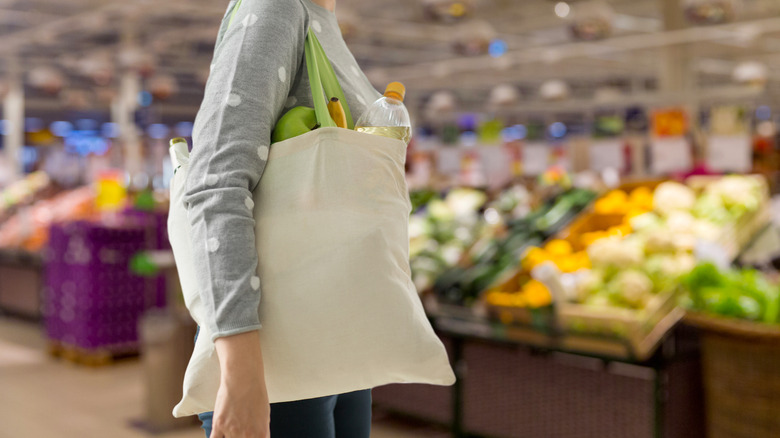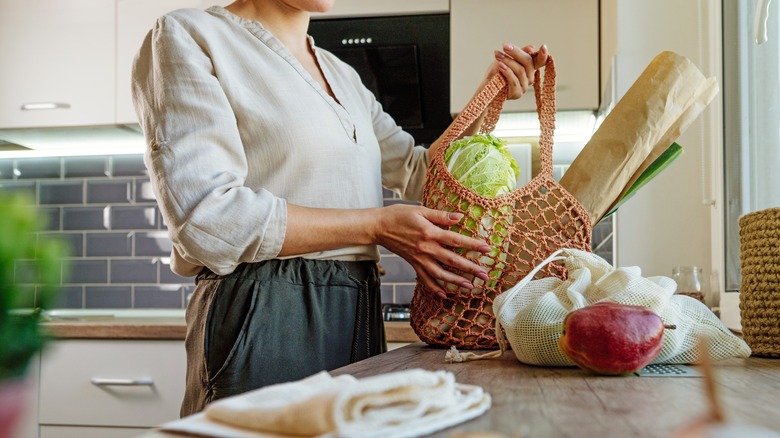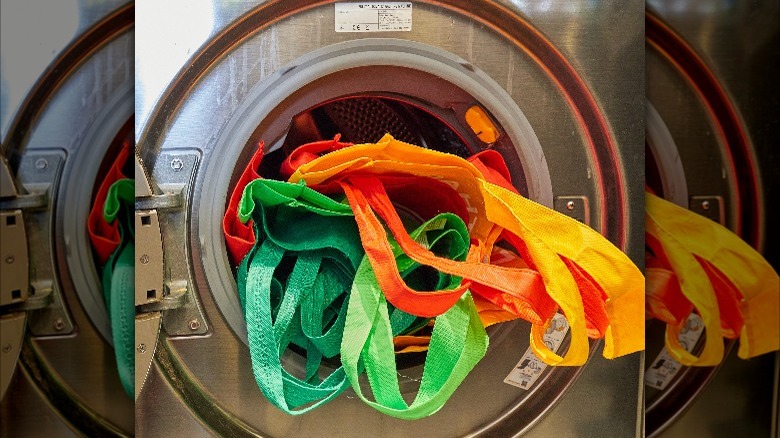How And When To Wash Reusable Grocery Bags To Curb Contamination
To curb the amount of non-degradable plastic material that's killing animals and polluting our air, soil, and sea, municipalities globally have rolled out plastic bag bans forcing consumers to carry reusable totes each time they shop or pay a nominal fee.
While controversy surrounds the environmental impact of manufacturing single-use plastic bags versus cotton totes, consumers have been lulled into believing we're doing the right thing without considering the health risks associated with the swap. We were busy remembering to take the bags from the trunk into the grocery store and were never told we had to wash them too.
If that sounds familiar, you are not alone. According to a 2011 study from the University of Arizona and Loma Linda University, only 3% of shoppers wash their reusable grocery bags regularly. Yet, 99% of the bags tested contained harmful bacteria and "several opportunistic pathogens" that could cross-contaminate ready-to-eat foods like produce and surfaces like the kitchen counter where we unpack our groceries and eat our meals.
The study found coliform bacteria like E.Coli (a dangerous bacteria found in human and animal waste) in half of the sample size, and totes soiled with meat juices had ten times more bacteria. Thankfully regular washing can curb contamination.
How often to wash reusable grocery bags
The Centers for Disease Control (CDC) estimates that 48 million people in the United States get sick from foodborne illnesses such as Salmonella, Listeria, and E. Coli yearly, and 3,000 infants, older people, and those with a compromised immune system die. And that's based on reported cases so the number could be much higher.
We transport reusable bags from our homes to contaminated surfaces like the checkout conveyor belt and the infant seat of the grocery cart (the dirtiest surface in this cycle). Then we fill them with perishable food and place them in a hot trunk, the ideal breeding ground for the bacteria to rapidly multiply, before bringing them into our kitchens.
To mitigate the risk of contamination, the study's authors recommend treating reusable bags like underwear and washing them after each use. Bleaching or washing the bags with detergent kills 99% of harmful bacteria from meat juices, contaminated produce, dirty shoes, and everything else we put in them.
Consumers should designate bags for different items so fresh fruits and vegetables never touch the meat bag. Avoid putting raw foods like steaks, eggs, or salmon with other groceries, even in a small grocery shop. Although it's not as eco-friendly, place raw proteins in disposable plastic or paper bags to prevent cross-contamination. And don't use your grocery bags to transport items like gym clothes or shoes.
The proper way to wash reusable grocery bags
Most of us have amassed a giant collection of reusable bags over the years between businesses giving away logoed totes, picking up an inexpensive insulated grocery bag at checkout, or purchasing a stylish designer option. Although the bags are meant to last forever to warrant the environmental impact of manufacturing them, we should prioritize our health, especially the most vulnerable, and disinfect them regularly to prevent cross-contamination and remove stains and dirt.
After each use, cloth and canvas totes can be thrown in the washing machine with warm water and detergent or bleach. Wash them separately from your clothes, and allow the bags to dry completely before storing them. Since they are the easiest to maintain, cotton and canvas reusable bags are preferred.
Recycled polypropylene bags should be hand washed to delay the seams from tearing or handles ripping, and using the washing machine will limit their lifespan to five washes. Bags that require hand washing should be soaked, not sprayed, with a disinfectant containing peracetic acid, oxy-clean, or Thymol (a natural disinfectant). Spray cleaning isn't effective since bacteria hides in missed creases and corners.



